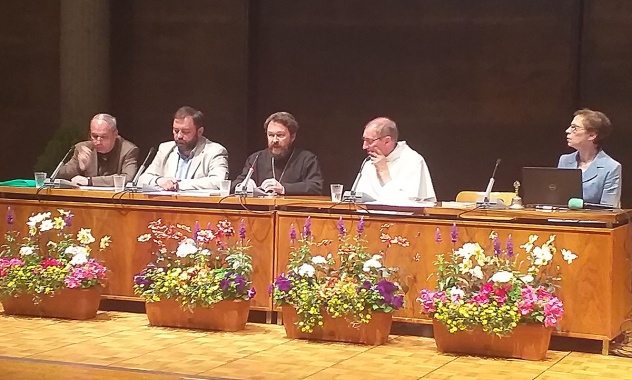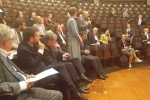Metropolitan Hilarion speaks at a conference on ‘Russia – Ukraine – Belarus: A Common Civilizational Space?’ in University of Fribourg
On 1st June 2019, a conference on ‘Russia – Ukraine – Belarus: A Common Civilizational Space?’ took place at the assembly hall of the University of Fribourg, Switzerland.
Rev. Guido Vergauwen, Rector Emeritus of the University of Fribourg, opened the conference, emphasizing an importance and relevance of its topic today.
A presentation by Rev. Dr. Gottfried Locher, President of the Federation of Swiss Protestant Churches, followed.
The keynote speaker at the conference was Metropolitan Hilarion of Volokolamsk, chairman of the Moscow Patriarchate’s Department for External Church Relations. In his address the archpastor said, in particular, “Russia, Ukraine and Belarus constitute one spiritual space framed by the Russian Orthodox Church. This space was formed over a thousand years, during which national borders appeared, disappeared and were moved many times, but spiritual commonality remained intact despite numerous external efforts aimed at shattering this unity. A witness to it is the thousand-year history of the Russian Orthodox Church.
As Metropolitan Hilarion reminded those present, when Prince Vladimir and after him the whole Rus’ had embraced Christianity, Orthodoxy became the main spiritual and moral pivot for all the East Slavic ethnic groups that soon appeared in these territories. “That moment marked the outset of the history of ‘Holy Rus’’ – a historical phenomenon which owed its existence to the powerful unifying role of the Russian Church in the vast territories of the Great, Little and White Rus’ and in other territories which at different times were in the sphere of its influence,” the hierarch said and emphasized that Orthodoxy became a unifying idea for the peoples of the Holy Rus’.
The DECR chairman made an excursus into the history of peoples of the historical Rus’ and the history of the Russian Orthodox Church, pointing out that the Church was with its people at all times and in all ordeals, including the hardest ordeals of the 20th century which brought world wars, falls of empires, persecutions for faith, the largest in scale in the world history, as well as collapse of the USSR, inter-ethnic conflicts and civil confrontations.
Speaking about the present-day situation, Metropolitan Hilarion of Volokolamsk noted that political processes in Ukraine pertaining to the formation of an independent state, have become a great test of the unity of the Russian Orthodox Church. “The state authorities of this country provoked and supported a schism in Ukrainian Orthodoxy, which remains to be a running sore on the body of our Church. Representatives of the old, still Soviet, elite who found themselves overnight at the head of a new state and sought to retain their power, stood in an acute need of support to rely on in that situation. They found such support in the person of nationalistic forces who declared the building of a sovereign Ukraine as impossible without the creation of an independent Ukrainian Church fully torn away from the Moscow Patriarchate. The demand of autocephaly, that is, full ecclesiastical independence, which was first formulated in the nationalistic milieu and soon after picked up by the authorities of the country, was embodied in the slogan: ‘Independent Church to Independent State’,” Metropolitan Hilarion added.
The implementation of this plan appeared not easy in a situation when the majority of the episcopate, clergy and laity of the Ukrainian Orthodox Church did not support the idea of autocephaly, Metropolitan Hilarion pointed out and told about the history of the schism led by former Metropolitan of Kiev, Philaret Denisenko – the schism which from the very beginning enjoyed full support of the state authorities and protection of the nationalistic forces, including rather radical ones. However, the vast majority of the Ukrainian believers remained faithful to the canonical Ukrainian Orthodox Church.
“The deposition of Philaret Denisenko by the Russian Orthodox Church was recognized by all the Local Orthodox Churches including in a written form by the Patriarchate of Constantinople,” Metropolitan Hilarion continued. He reminded the participants in the conference that as far back as 2016, during the Synaxis of Primates of the Orthodox Churches in Chambésy, Patriarch Bartholomew of Constantinople welcomed Metropolitan Onufry of Kiev and All Ukraine, “as the only canonical head of the Orthodox faithful in Ukraine, certainly with all his subordinate hierarchs” and promised not to take any unilateral actions linked with legalizing the schism in Ukraine or granting autocephaly to it.
“Regrettably, less than two years later, Patriarch Bartholomew did exactly what he had promised not to do,” the archpastor added, “In October 2018, the Synod of the Patriarchate of Constantinople made a whole number of unilateral decisions concerning the church life in Ukraine.” As Metropolitan Hilarion emphasized, it was done with complete disregard for the Ukrainian Orthodox Church, which from the very beginning stated its non-recognition of all these actions.
“It is impossible to find explanations for the actions of the Church of Constantinople in the Orthodox canon law. They represent an evident and gross violation of the canons of the Church, Orthodox ecclesiology and the very foundations of inter-church relations. At the same time, one cannot fail to notice the presence of a non-ecclesiastical factor in the decision made at Phanar. Nobody tried and tries to conceal the exceptional role played by now former President of Ukraine in granting ‘a tomos of autocephaly’,” the DECR chairman said.
Metropolitan Hilarion presented facts of seizures of church buildings of the canonical Ukrainian Church, of beatings of old men and women, of banishments of priests from the places of their ministry, of fictitious votes of territorial communities’ members in favour of “transfers” of religious communities to the schismatics. As the DECR chairman noted, the efforts to seize churches plummeted immediately after the victory of Vladimir Zelensky in the presidential elections in Ukraine; there have even been cases of taking action to prevent such abuse. “We are looking with hope to the first moves of the new leadership of our fraternal country. We hope for the establishment of peace in Ukraine, elimination of hatred and enmity, protection of the rights of believers of all confessions and non-interference in the affairs of religious communities in the country,” Metropolitan Hilarion added.
Answering the question put in the title of the conference, Metropolitan Hilarion said, “Russia, Ukraine and Belarus are one spiritual space. We contest neither national self-identification of the three Slavic nations, nor the boundaries of the independent states, but we will continue our struggle for the preservation of the unity of the Russian Orthodox Church which assures spiritual unity of all Orthodox believers living within its space irrespective of their national and ethnic belonging. Simple words of the holy elder Lavrenty of Chernigov ‘Russia, Ukraine, Belarus – all these are Holy Rus’’ remain topical and resound in the hearts of millions of people.”
A presentation by Professor Sergei Bortnik of the Kiev Theological Academy followed. He shared with the participants in the conference his reflections on the history and present-day situation in Ukraine and on the plight of the Orthodox Church in the country. Speaking about the current ecclesiastical situation in Ukraine, and about the problem of the Ukrainian schism in particular, as well as about the creation of a structure titled “Orthodox church of Ukraine” by means of the merger of two schismatic organizations, he mentioned conflicts arising at the parochial level due to attempts to change the parishes’ jurisdictions and transfer them from the canonical Church to the newly-institutioned “OCU.” As the speaker pointed out, in most cases the core of the parish led by a priest remain faithful to the canonical Ukrainian Orthodox Church, while the vast majority of people who only occasionally attend church services and are under the influence of state and nationalistic propaganda of the time of Petro Poroshenko’s presidency, express their preference for the “new independent church.”
“Christian Values in Belarus: Prospects and Problems” – such was the topic of an address by Mr. Andrei Danilov, head of Religious Studies Department at the Institute of Theology of the Belarusian State University, professor of the Minsk Theological Seminary. As the speaker noted, the Belarusian society has a very solid confessional structure and since the beginning of this century a number of believers among the adult population of Belarus has increased in 25 %. According to the latest researches, almost three fourths of the population identify themselves with some religious tradition: 86% of them call themselves Orthodox Christians, 12% – Catholics, and 2% identify themselves with all the other confessions. Therefore, Orthodoxy has been recognized as the prevailing religious confession in Belarus.
A discussion followed the addresses, during which Metropolitan Hilarion and the two other speakers answered numerous questions from the audience.
Among the participants in the conference were Prof. Franz Mali, vice-rector of the University of Fribourg; Prof. Barbara Hallensleben of the University of Fribourg; Prof. Johannes Oeldemann (Padeborn, Germany); Archpriest Jivko Panev, editor-in-chief of Orthodoxie.com website; as well as the faculty and students of the Faculty of Theology of the University of Fribourg.
After the conference Metropolitan Hilarion of Volokolamsk gave interviews to Orthodoxie.com interment portal and the Swiss Catholic News Agency.
DECR Communication Service












